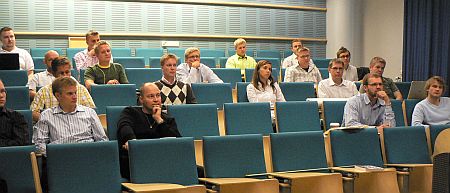I’m a big fan of Disclosing New Worlds by Charles Spinosa, Fernando Flores and Hubert Dreyfus. Its practice perspective, rooted in Dreyfus’ reading of Heidegger, is complementary to the social theory of Pierre Bourdieu, who provides a foundation for the research into communities of practice by Etienne Wenger and John Seely Brown.
Thus, I was thrilled to read an article by Peter J. Denning and Robert Dunham on “Innovation as Language Action” in Communications of the ACM. (To make the social network link, Dunham was at BDA with Flores). This article appeared in a special issue on “Two Decades of the Language-Action Perspective“.
Working from the conclusion to the article, Denning & Dunham make the main claims that:
- Innovation occurs when a group or community adopts a new practice.
- Invention and innovation are two different skill sets.
- The language-action perspective helped identify seven practices that constitute the innovation skill set.
- Anyone can learn the innovation skill by mastering the seven personal practices. [p. 52]
I like the first three claims, but have some reservations on the fourth!
Denning & Dunham are helpful to clarifying innovation research by making the distinction between theoretical, empirical and generative frameworks:
I’m a big fan of Disclosing New Worlds by Charles Spinosa, Fernando Flores and Hubert Dreyfus. Its practice perspective, rooted in Dreyfus’ reading of Heidegger, is complementary to the social theory of Pierre Bourdieu, who provides a foundation for the research into communities of practice by Etienne Wenger and John Seely Brown.
Thus, I was thrilled to read an article by Peter J. Denning and Robert Dunham on “Innovation as Language Action” in Communications of the ACM. (To make the social network link, Dunham was at BDA with Flores). This article appeared in a special issue on “Two Decades of the Language-Action Perspective“.
Working from the conclusion to the article, Denning & Dunham make the main claims that:
- Innovation occurs when a group or community adopts a new practice.
- Invention and innovation are two different skill sets.
- The language-action perspective helped identify seven practices that constitute the innovation skill set.
- Anyone can learn the innovation skill by mastering the seven personal practices. [p. 52]
I like the first three claims, but have some reservations on the fourth!
Denning & Dunham are helpful to clarifying innovation research by making the distinction between theoretical, empirical and generative frameworks:



